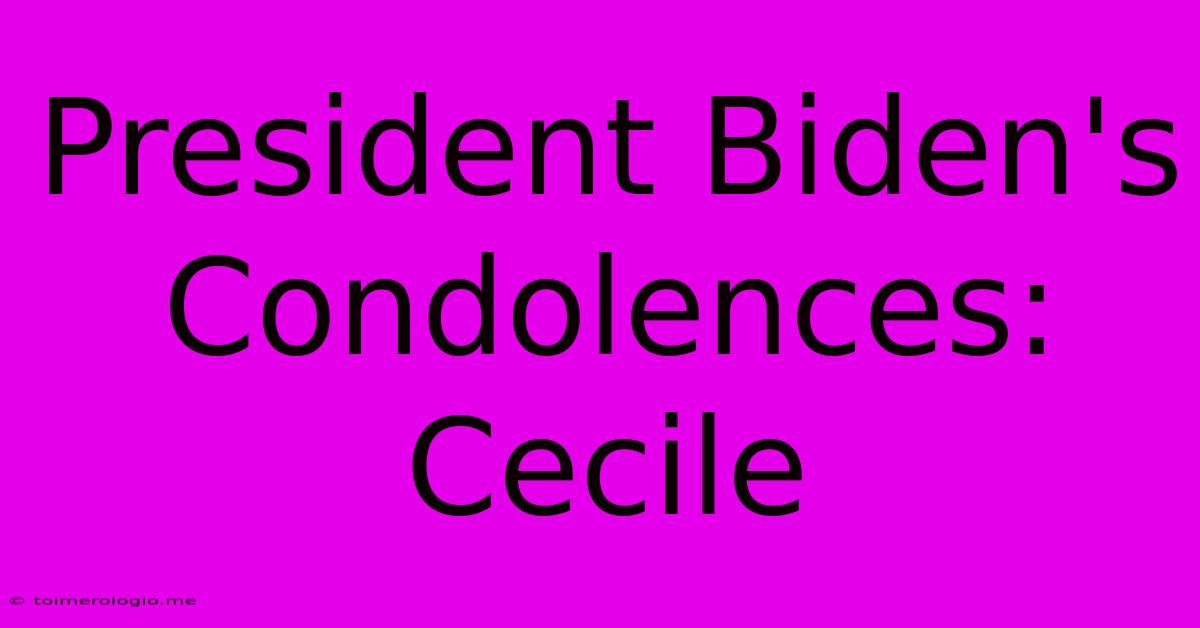President Biden's Condolences: Cecile

Discover more detailed and exciting information on our website. Click the link below to start your adventure: Visit Best Website toimerologio.me. Don't miss out!
Table of Contents
President Biden's Condolences: A Deep Dive into the Cecile Tragedy and its Impact
President Biden's expressions of condolence are often met with scrutiny, analyzed for their tone, timing, and the broader political context. A recent instance, focusing on the passing of an individual named Cecile (the full name may not be publicly available for privacy reasons), offers a compelling case study. While details surrounding Cecile's life and death may be limited to protect privacy, the event allows us to explore the role of presidential condolences in a grieving nation and the broader implications of such pronouncements. This article delves into the significance of these condolences, examining their impact on both the immediate family and the wider public.
Understanding the Significance of Presidential Condolences
Presidential condolences are more than mere formalities. They represent the empathy and solidarity of the nation's highest office. They carry immense weight, offering comfort to grieving families and providing a sense of national unity during times of loss. These expressions, however, are also subject to intense public and media scrutiny. The words chosen, the tone employed, and even the timing of the statement can become points of discussion and even controversy.
Beyond Words: The Impact of Presidential Condolences
The impact of presidential condolences extends far beyond the words themselves. They serve several crucial functions:
-
Offering solace to the bereaved: The expression of sympathy from the President offers a powerful message of support to grieving families. Knowing that the leader of the nation acknowledges and shares their grief can provide a measure of comfort during an incredibly difficult time. For the family of Cecile, this would likely be a key aspect of the President's message.
-
Unifying the nation in grief: Shared experiences of loss, even if experienced vicariously, can foster a sense of collective empathy. The President's condolences help to publicly acknowledge the loss, reminding the nation of its shared humanity and fostering a sense of unity in the face of tragedy.
-
Elevating the significance of the loss: The President's acknowledgment of Cecile's passing elevates the event beyond a private tragedy. It gives it a sense of public recognition, honoring the life and contributions, however private, of the individual.
-
Setting a national tone: The President's response sets the emotional tone for the nation's response to the loss. A thoughtful and empathetic response can help guide the public conversation and encourage respectful mourning.
Analyzing the Context: Cecile's Story and its Wider Implications
Unfortunately, specific details about Cecile's life and the circumstances of her passing may not be publicly available for privacy reasons. However, regardless of the specific details, the underlying themes remain: the fragility of life, the importance of community support during times of grief, and the role of leadership in offering comfort and guidance.
The President's words, therefore, take on added significance. Even without knowing the specifics of Cecile's life, we can analyze how the President's statement likely aimed to achieve the following:
-
Expressing genuine empathy: The words likely focused on conveying sincere sorrow and understanding, acknowledging the pain of the loss.
-
Highlighting positive aspects of Cecile's life: Even with limited information, the statement would likely have sought to find some positive aspects to remember, if known to the President.
-
Offering words of hope and resilience: The statement may have conveyed a message of hope for the future, recognizing the enduring strength of the human spirit.
The Public Reception and Political Implications
The President's condolences are always subject to public scrutiny, analyzed for their sincerity, tone, and appropriateness. The political climate can also influence public reactions. While any negative reactions to the President's statement about Cecile are speculative in the absence of specific details, it is important to note the potential for diverse interpretations and criticisms. These could include:
-
Criticisms of insufficient empathy: Some may find the President's words lacking in sincerity or empathy.
-
Concerns about the political timing: The timing of the condolences might be subjected to scrutiny, especially if it's perceived as opportunistic or politically motivated.
-
Comparisons with previous condolences: The public response may be influenced by comparisons to the President's previous statements on similar occasions.
Conclusion: The Enduring Importance of Presidential Condolences
Despite the potential for criticism and the inherent complexities of navigating public emotion, presidential condolences remain a crucial aspect of presidential leadership. The expression of sympathy for Cecile, even with limited public information, underscores the importance of these gestures in acknowledging loss, offering comfort, and fostering national unity. The President's words, carefully chosen or not, contribute to a narrative of shared grief and collective resilience. The impact of these condolences, both on the family of Cecile and the broader public, is a testament to the power of empathy and the enduring significance of national leadership in times of tragedy. Further analysis would require more publicly available information concerning Cecile and the specifics of the President's statement, but this exploration highlights the wider implications of such events and presidential actions.

Thank you for visiting our website wich cover about President Biden's Condolences: Cecile. We hope the information provided has been useful to you. Feel free to contact us if you have any questions or need further assistance. See you next time and dont miss to bookmark.
Also read the following articles
| Article Title | Date |
|---|---|
| Why Did Klobuchar Address Trumps Gathering | Jan 24, 2025 |
| Paris Agreement Trumps Withdrawal | Jan 24, 2025 |
| Ivanka Trump At 2025 Inauguration | Jan 24, 2025 |
| Feminist Leader Cecile Richards Story | Jan 24, 2025 |
| Us Exit From Paris Climate Deal | Jan 24, 2025 |
